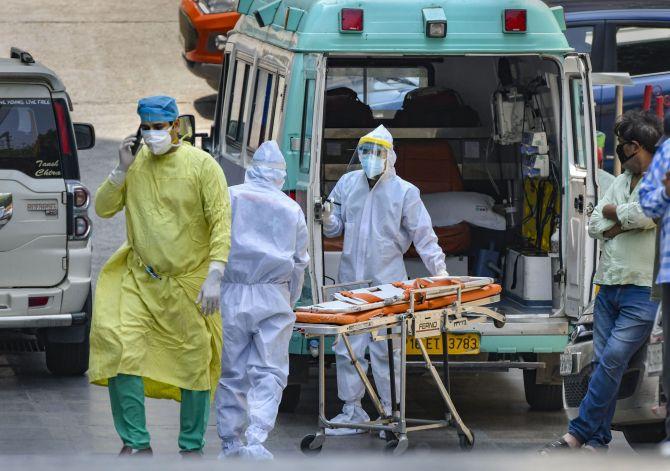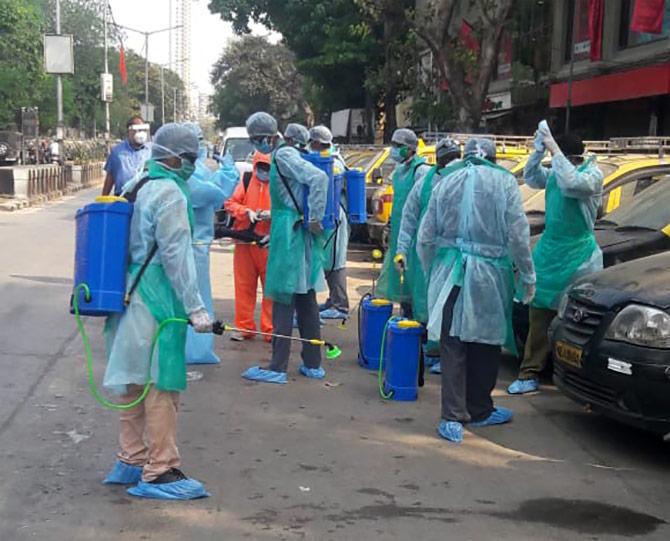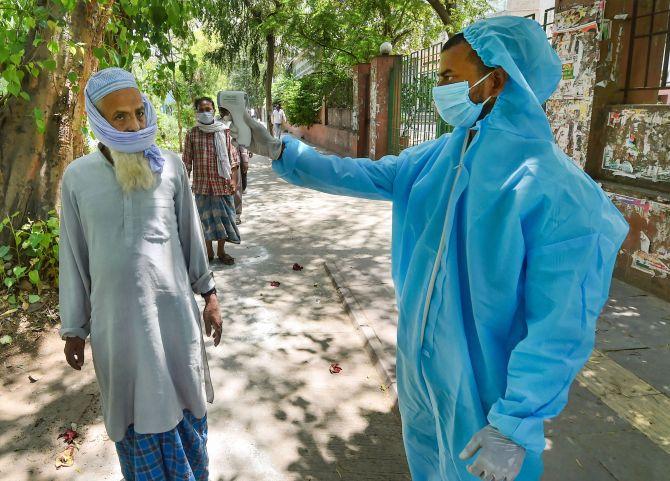'Our drains are not filled with bodies, our hospitals not run out of beds.'
'That good news, or absence of expected bad news, is the truth that so many in the international community, and also within India, seem unable to handle,' notes Shekhar Gupta.

Why are we talking movies in the era of COVID-19? Especially when it is neither Outbreak, nor Contagion.
It is the 1992 classic, A Few Good Men.
Among the most quoted exchanges from that film is Tom Cruise as Lieutenant Daniel Kaffee demanding the truth from Jack Nicholson's Marine Colonel Nathan R Jessep, who famously throws a counter at the prosecutor: You can't handle the truth.
That was about an ugly and inconvenient truth that Nicholson's character was seeking to hide and justify. For this week's argument, however, we are reversing that logic.
Can we confront you, therefore, with the same counter, you can't handle the truth, when it isn't as bad as you might have expected in this coronavirus crisis in India?
India is by no means going through a picnic.
The entire country is locked down, more stringently than any other in the world, with all attendant consequences: Economic stall, job losses, even mass misery in significant pockets and hunger.
Yet, the truth that many, especially in the global commentariat, find so inconvenient is that, contrary to what so many wise people with fancy degrees from a university in this league or that might have asserted by now, millions or lakhs, or even tens of thousands of us are not dying.
Apologies for letting you down.
Our drains are not filled with bodies, our hospitals not run out of beds.
Our crematoriums and graveyards are not out of wood or space.
There is not even a cricket-field sized sliver of India anywhere that might help you make a convenient or macabre comparison with the Spanish Flu of 1918.
That good news, or absence of expected bad news, is the truth that so many in the international community, and also within India, seem unable to handle.
We seek refuge in the eternal wisdom of N R Narayana Murthy: 'In God we trust. The rest of you bring data.'
The daily Government of India briefing on the COVID-19 crisis is often criticised for opacity, lack of information, and some Yes Minister style bureaucratic ducking and weaving.
But it gives you a set of data. We have the right then to be suspicious.
One scholar who tracks this data each day and publishes a string of brilliantly informative charts is the Brookings Institution's Shamika Ravi.
You can check these out on her Twitter handle (@ShamikaRavi).
Her key chart shows us how India's infections numbers had picked up pace by March 23, but then began a decline, especially once the Tablighi bulge was absorbed, by early April.
These went from doubling in three days to five, then four (with the Tablighi cluster) and now stand at five days.
Her chart also assumes that if there was no lockdown, India's infections would be about nine times higher than the figure now.

Now how can this be true, you can well ask.
Can you trust official data? Look elsewhere. As we did.
The data plotted by the darling of the public health community, World Health Organisation, plots the rate of doubling in seven days now.
As does the European Centre for Disease Control. Most delightfully, the darling of the doomsayers, Johns Hopkins University, whose logo was used by a set of them predicting millions of us dead and was called out for misusing it, plots this rate of doubling of COVID-19 cases in India at eight days.
I spend most of my time, especially during the lockdown, reading up and watching whatever is available globally on coronavirus.
Every couple of days there is a story or a commentary insinuating and implying three things: One, India must be concealing figures.
Sometimes a snide remark in a TV discussion.
Two, that India will soon -- and inevitably -- be the worst victim of the virus with millions dead.
And three, that we in the Indian media are either complicit with the Modi government and won't speak the truth, or so intimidated that we can't.
The fact is that all our reporters are also looking at the same set of data points with a high degree of suspicion.
Something to prove that the government figures are a gross under-estimation or a China/North Korea style fudge.
But we do not find such facts, at hospitals, in surveillance figures, from so many state governments where anti-BJP parties rule.
An easy option is to follow the way of the BBC, which ran a story quoting two anonymous doctors from an unnamed hospital in Mumbai claiming lots of people were dying of respiratory collapse, but were either not tested for Covid or not declared its victims.
Would they run a story like that on Britain, or any other country where they'd treat human life in a more dignified, less cavalier fashion? But this is the 'bhookha-nanga' India, what is the story if it isn't at least a few hundred thousand Indians dead? Especially when the UK, Italy, Spain, and the US are already floating in high five figures.
Or unless you begin counting bodies like our holy national accountant of yore used to count notional losses, with zeros freely added.
The truth so far, fortunately, is less 'fun' than that.
I am not wagering anything on the news not taking a turn for the worse tomorrow, especially after the lockdown opens, but we can't make those presumptions now.
This is the most polarising global pandemic in world history.
First, because the virus came from China and the deputy superpower does not want anyone mentioning that fact.
Second, because the two global leaders the liberal community detests, Donald J Trump and Boris Johnson, have bungled with its handling. And third, closer home, because Narendra Damodardas Modi is seen as a member of the same Alpha Male Brotherhood.
So sharply has this disease politicised us that even an 86-year-old drug like chloroquine has become contentious because Mr Trump is prescribing it, and Mr Modi is dispensing it.

All stories do not necessarily turn out to be as lipsmackingly juicy as you might have expected them to be.
And poor as India might be, its media, civil society, and, most importantly, the common citizen haven't been mentally and spiritually transhipped post-2014 to North Korea or China that they'd pay no heed to fellow countrymen dying around them.
Or to believe their government that claims there is no coronavirus victim, or that, oh, I got my count of the dead a little bit wrong, by just 50 per cent (to begin with) in Wuhan.
India, unfortunately, has a very recent experience of having been subjected to such callous and criminal excess by global influencers, especially from some sections of foundation-fattened public health mafias.
Strong words, but why waste euphemisms on those who unanimously counted India's HIV positive cases to be 5.7 million and rising.
Until the summer of 2007 when a paper in Lancet derailed the gravy train? Everyone, from UNAIDS, to WHO to the richest foundations, all conveniently rectified the numbers.
You know to what: 2.5 million. India was being subjected to a 128 per cent exaggeration.
India's numbers have been dropping since.
You can read two stories in the venerable New York Times (here and here (both external links)) on how everyone who had been complicit quietly retreated and reset. No one said sorry.
A few honourable Indians complained.
Civil servant S Y Quraishi (then head of the National Aids Control Organisation or NACO) in 2005 and before that Shatrughan Sinha as health minister in 2002, when Bill Gates arrived with a grant of $100 million for AIDS control and predicted that by 2010 India will have 20 to 25 million cases.
They were ignored.
They all got away with it, including so many in our bureaucracy, activists and health NGOs who had joined that well-funded, wine 'n cheese war to 'save' India.
They all retreated. But the damage they did wasn't just philosophical.
It was real. The Hollywoodisation of AIDS in India took attention and resources away from more real issues. Like tuberculosis, to begin with.
By Special Arrangement with The Print












 © 2025
© 2025